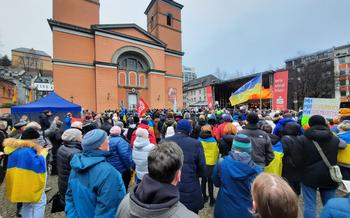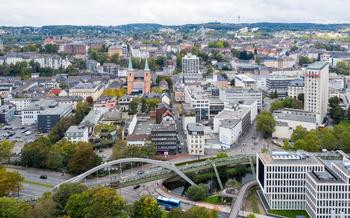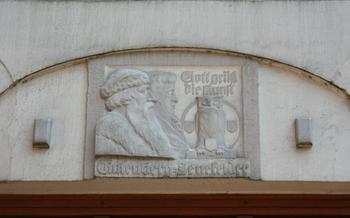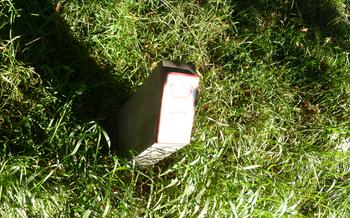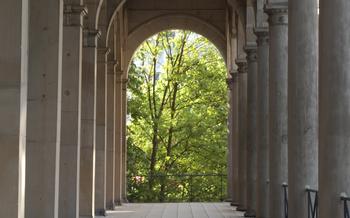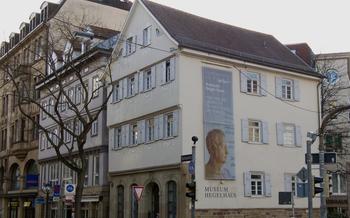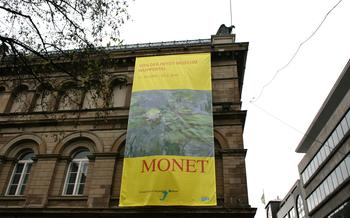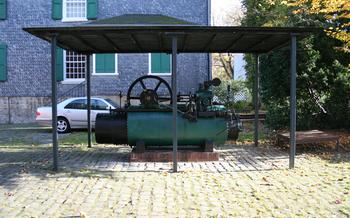
Engels Haus – Friedrich Engels Museum in Wuppertal
- Engels Haus: A Historical Gem in Wuppertal
- Stepping into the Life of Friedrich Engels
- Exploring the Museum's Exhibits
- Understanding Engels' Impact on Socialism
- The Engels Haus and the Arbeiterbewegung
- Wuppertal's Industrial Heritage
- Transportation to the Engels Haus
- Admission and Opening Hours
- Guided Tours and Audio Guides
- Engels Haus: Beyond the Museum Walls
- Engels' Legacy in Modern Times
- Educational Programs and Workshops
- Research and Study Opportunities
- Souvenirs and Publications
- Insider Tip: Hidden Gems of the Engels Haus
Engels Haus: A Historical Gem in Wuppertal
Located in the heart of Wuppertal, Germany, the Engels Haus stands as a testament to the life and legacy of Friedrich Engels, a pivotal figure in German history. Built in 1848, this historic building once served as the home of Engels' family and is now transformed into a museum dedicated to his remarkable contributions. The Engels Haus offers a unique opportunity to delve into the life of this influential philosopher, economist, and social theorist, gaining insights into his profound impact on the development of socialist thought and the labor movement.
As you step into the Engels Haus, you are transported back in time to the 19th century, where the spirit of revolution and social change permeated the air. The architectural features of the building itself are a testament to the era in which Engels lived, with its elegant facade and intricate details reflecting the cultural and social influences of the time. The Engels Haus stands as a symbol of the rich history and heritage of Wuppertal, a city deeply intertwined with the lives and works of Engels and other notable figures of the socialist movement.
Stepping into the Life of Friedrich Engels
Friedrich Engels, born in 1820 in Barmen, Wuppertal, played a pivotal role in shaping the course of German history. His early life was marked by a comfortable upbringing in a wealthy industrialist family. The family's involvement in the textile industry exposed Engels to the harsh realities of industrial capitalism and the plight of the working class.
Engels' education laid the foundation for his intellectual pursuits. He studied philosophy, history, and economics, developing a critical understanding of the social and economic systems of his time. His collaboration with Karl Marx, whom he met in 1844, proved to be a defining moment in his life. Together, they revolutionized the field of social theory and economics, developing the groundbreaking theory of Marxism.
Engels' contributions extended beyond theoretical work. He actively participated in the workers' movement, organizing and advocating for the rights of the working class. His writings, such as "The Condition of the Working Class in England" and "Principles of Communism," provided a powerful critique of capitalism and laid the foundation for socialist thought.
Exploring the Museum's Exhibits
The Engels Haus - Friedrich Engels Museum in Wuppertal offers a captivating journey into the life and work of Friedrich Engels. The museum houses a treasure trove of artifacts, documents, and interactive displays that bring Engels' ideas and theories to life. Visitors can delve into his personal life, his collaborations with Karl Marx, and his contributions to the development of socialism.
Among the highlights of the museum's exhibits are Engels' personal belongings, including his writing desk, armchair, and library. Visitors can also explore interactive displays that showcase his economic and philosophical theories, such as the concept of surplus value and the theory of historical materialism. Multimedia presentations bring history to life, providing insights into Engels' life and work through audio-visual experiences.
The museum also features a replica of Engels' study, where he spent countless hours writing and collaborating with Marx. Visitors can immerse themselves in the atmosphere of Engels' intellectual pursuits, surrounded by his books, manuscripts, and personal effects.
Understanding Engels' Impact on Socialism
Friedrich Engels played a pivotal role in the development of socialist thought and the formation of the modern socialist movement. He collaborated closely with Karl Marx, co-authoring the seminal work "The Communist Manifesto" in 184This revolutionary text laid the foundation for the socialist movement and outlined the principles of class struggle and the need for a socialist revolution to overthrow capitalism. Engels' contributions to socialist theory were wide-ranging and profound. He explored the concept of historical materialism, emphasizing the role of economic factors in shaping social and political structures. His work on the family, private property, and the state provided a comprehensive analysis of the capitalist system and its inherent contradictions.
Engels' writings and activism were instrumental in spreading socialist ideas throughout Europe and beyond. He helped organize the First International Workingmen's Association, known as the First International, which brought together socialist and labor movements from across the continent. Through his participation in this international organization, Engels contributed to the development of a global socialist movement and fostered solidarity among workers worldwide. His legacy as a pioneer of socialism continues to inspire and influence social movements and political thought to this day, demonstrating the enduring impact of his contributions to the field.
The Engels Haus and the Arbeiterbewegung
The Engels Haus stands as a testament to Friedrich Engels' deep connection to the German labor movement, also known as the Arbeiterbewegung. Engels played a pivotal role in organizing workers and advocating for their rights, using his insights into social and economic theory to champion the cause of the working class. His involvement in the Arbeiterbewegung extended beyond theoretical contributions; he actively participated in organizing workers' associations, fighting for better working conditions, and promoting the ideals of socialism.
The Arbeiterbewegung gained momentum in Germany during the 19th century, fueled by the rapid industrialization and the exploitation of workers. Engels recognized the plight of the working class and dedicated his efforts to improving their lives. He collaborated with other socialist thinkers and activists, including Karl Marx, to develop a comprehensive theory of socialism that would serve as a guiding force for the labor movement.
Engels' writings, particularly "The Communist Manifesto," co-authored with Marx, became foundational texts for the Arbeiterbewegung. These works provided a theoretical framework for understanding the class struggle and advocating for the overthrow of capitalism. Engels' emphasis on the importance of working-class solidarity and international cooperation resonated with workers across Germany and beyond, inspiring them to organize and fight for their rights.
The Engels Haus not only preserves the memory of Friedrich Engels but also serves as a reminder of the significance of the Arbeiterbewegung in German history. It highlights the crucial role that Engels played in shaping the labor movement's ideology and strategies, leaving a lasting impact on the fight for workers' rights and social justice.
Wuppertal's Industrial Heritage
Wuppertal, once a thriving industrial hub, bears witness to a rich legacy of textile production and manufacturing. The city's industrial heritage is deeply intertwined with the Engels family, who played a pivotal role in shaping Wuppertal's economic and social landscape. The Engels Haus stands as a testament to this industrial past, offering a glimpse into the city's transformation from a small village to a bustling industrial center.
In the 19th century, Wuppertal emerged as a major center for textile production, earning the nickname "Textile City." The textile industry flourished, driven by the availability of raw materials, skilled labor, and access to transportation routes. The Engels family, with their entrepreneurial spirit and business acumen, played a significant role in this industrial growth. They established textile factories, creating jobs and contributing to the city's economic prosperity.
The industrialization of Wuppertal brought about profound changes to the city's urban fabric. New factories and workers' housing were constructed, leading to the expansion of the city. The influx of workers from neighboring regions resulted in a diverse and vibrant population. However, the rapid industrialization also brought challenges, including poor working conditions, overcrowding, and social inequality.
The legacy of industrialization in Wuppertal is still visible today. Many former factory buildings have been repurposed into cultural venues, creative spaces, and residential lofts, giving the city a unique blend of industrial charm and modern urban living. The Engels Haus, with its historical significance and connection to the textile industry, serves as a reminder of Wuppertal's industrial heritage and its impact on the city's identity.
Transportation to the Engels Haus
Reaching the Engels Haus is a breeze, whether you prefer public transport or the convenience of your own vehicle. If you're opting for public transport, hop on the Schwebebahn, Wuppertal's iconic suspension railway, and alight at the "Wuppertal-Elberfeld" station. From there, it's just a short walk to the museum.
For those driving, the Engels Haus is easily accessible via the A46 motorway. Take the "Wuppertal-Elberfeld" exit and follow the signs to the museum. Ample parking is available nearby, ensuring a hassle-free visit.
Visitors with disabilities will be pleased to know that the Engels Haus is fully accessible. Designated parking spaces and wheelchair ramps make it easy for everyone to explore the museum's treasures.
Admission and Opening Hours
Admission Fees:
- Regular admission: 6 euros
- Reduced admission (students, seniors, disabled): 4 euros
- Family ticket (2 adults and up to 3 children): 15 euros
- Group rates available upon request
Opening Hours:
- Tuesday to Sunday: 10 am to 6 pm
- Closed on Mondays and public holidays
Tips for Planning Your Visit:
- To avoid crowds, plan your visit during the weekdays or early in the day.
- Guided tours are available in German and English. Check the museum's website for tour schedules and reservations.
- The Engels Haus offers audio guides in various languages for self-guided exploration.
- Allow at least 1-2 hours to fully explore the museum's exhibits and learn about Engels' life and work.
Guided Tours and Audio Guides
Enhance your visit to the Engels Haus by opting for a guided tour, an excellent way to delve deeper into the life and legacy of Friedrich Engels. Knowledgeable guides, fluent in various languages, lead these tours, providing insightful commentary and anecdotes that bring history to life. Highlights of the guided tour include a comprehensive overview of Engels' contributions to philosophy, economics, and social theory, as well as his collaboration with Karl Marx and the development of Marxism.
For those who prefer a more independent exploration, audio guides are available in multiple languages. These devices offer a self-guided tour experience, allowing you to explore the museum at your own pace while listening to informative audio commentary. Whether you choose a guided tour or an audio guide, you'll gain a deeper understanding of Engels' impact on socialism and the Arbeiterbewegung, as well as his enduring legacy in shaping modern political thought and social movements.
Engels Haus: Beyond the Museum Walls
A visit to the Engels Haus offers a gateway to exploring the surrounding neighborhood and uncovering its rich historical significance. Delve into the Arbeitersiedlung Cronenberg, a former working-class district where Engels resided and engaged with the local community. Explore the historic streets and admire the well-preserved architecture that reflects the city's industrial past. Discover the Cronenberg Evangelical Church, where Engels' father served as a pastor, and experience the deep connection between the Engels family and the community.
Venture beyond the immediate vicinity of the Engels Haus and immerse yourself in Wuppertal's diverse cultural offerings. Visit the Von der Heydt Museum, which houses an impressive collection of art from the Middle Ages to the present day. Take a leisurely stroll through the city center, admiring the picturesque architecture and vibrant atmosphere. For a unique perspective, embark on a Schwebebahn ride, an iconic suspended monorail that offers stunning views of the city and the surrounding valley.
Wuppertal also boasts a vibrant culinary scene, with an array of restaurants, cafes, and bars catering to various tastes. Indulge in traditional German cuisine at a gemütlich restaurant, or savor international flavors at one of the many ethnic eateries. For a sweet treat, visit Café Konditorei Heinemann, a local institution famous for its delectable cakes and pastries.
Whether you're a history buff, a culture enthusiast, or simply seeking a memorable experience, Wuppertal and the Engels Haus offer a wealth of attractions and activities. Embrace the opportunity to delve into the life and legacy of Friedrich Engels while exploring the city's rich industrial heritage and vibrant contemporary culture.
Engels' Legacy in Modern Times
Friedrich Engels' ideas continue to resonate in contemporary society, shaping political thought and social movements worldwide. His analysis of capitalism, class struggle, and the exploitation of workers remains relevant in addressing issues of inequality, poverty, and social justice.
Engels' emphasis on the importance of understanding the historical context of social and economic phenomena has influenced modern historiography and sociological research. His work has also been influential in the development of feminist theory, particularly in his analysis of the oppression of women under capitalism.
In modern political discourse, Engels' ideas have been invoked by both left-wing and right-wing movements. His writings have been used to support arguments for socialism, communism, and social democracy, as well as to critique the excesses of capitalism and globalization.
Engels' legacy extends beyond academia and politics. His work has also influenced cultural and artistic expressions, including literature, film, and theater. His ideas have inspired artists, writers, and filmmakers to explore themes of social justice, class struggle, and the human condition.
By understanding Engels' legacy, we can gain a deeper appreciation of the complexities of modern society and the challenges we face. His work continues to offer insights and inspiration for those seeking to build a more just and equitable world.
Educational Programs and Workshops
The Engels Haus offers a range of educational programs and workshops designed to promote understanding and engagement with the life and work of Friedrich Engels. These programs are tailored to different audiences, including students, researchers, and the general public.
For students, the Engels Haus provides guided tours and educational materials that align with school curricula. Workshops and seminars delve deeper into specific aspects of Engels' thought, such as his contributions to economic theory or his analysis of the working class. These programs encourage critical thinking and foster a deeper appreciation for Engels' ideas.
Researchers and scholars can access the Engels Haus's extensive research facilities and resources. The museum's library houses a vast collection of Engels' writings, as well as works by his contemporaries and other influential thinkers. Researchers can also participate in seminars and workshops that bring together experts in various fields to discuss Engels' legacy and its relevance to contemporary issues.
The Engels Haus also offers educational programs for the general public. These programs include lectures, workshops, and film screenings that explore Engels' life, work, and impact on society. By participating in these programs, members of the public can gain a deeper understanding of Engels' contributions and their ongoing relevance in today's world.
Research and Study Opportunities
The Engels Haus is not just a museum; it also serves as a center for research and study on Friedrich Engels and his work. The museum houses a comprehensive collection of Engels' writings, as well as a wealth of secondary literature and research materials. Researchers and scholars from around the world come to the Engels Haus to study Engels' life and ideas in depth.
The museum offers a variety of educational programs and workshops for students, researchers, and the general public. These programs provide opportunities to learn more about Engels' work and its implications for contemporary society. The museum also hosts regular conferences and symposia on Engels and related topics.
If you are interested in conducting research on Friedrich Engels, the Engels Haus is an invaluable resource. The museum's staff is knowledgeable and helpful, and they can provide you with the assistance you need to conduct your research effectively. Whether you are a student writing a paper, a scholar conducting a research project, or simply someone who is interested in learning more about Engels, the Engels Haus is the place to go.
Souvenirs and Publications
At the Engels Haus, visitors can delve deeper into the life and work of Friedrich Engels through a diverse collection of souvenirs and publications. The museum shop offers a carefully curated selection of items that provide a tangible connection to Engels' legacy. Visitors can choose from an array of souvenirs, including books, postcards, and memorabilia, all designed to commemorate their visit.
For those seeking a deeper understanding of Engels' ideas and contributions, the museum also offers a range of publications, including his collected works, biographies, and scholarly analyses. These publications provide valuable insights into Engels' philosophy, economics, and social theory, allowing visitors to engage with his ideas long after their visit.
When selecting souvenirs, visitors can opt for items that reflect their personal interests. For example, those fascinated by Engels' collaboration with Karl Marx might choose a replica of the Communist Manifesto or a poster featuring a quote from their groundbreaking work. Alternatively, visitors interested in Engels' contributions to the labor movement might select a commemorative badge or a book on the history of the Arbeiterbewegung.
Whether seeking a unique souvenir or a thought-provoking publication, visitors to the Engels Haus will find a treasure trove of items to enrich their understanding of this influential historical figure.
Insider Tip: Hidden Gems of the Engels Haus
Beyond the main exhibits, the Engels Haus holds hidden gems that offer a deeper glimpse into Engels' life and legacy. One secret spot is the "Engels' Study," a meticulously preserved room where he worked and wrote. Visitors can admire his original desk, bookshelves lined with his favorite volumes, and personal belongings that provide a tangible connection to his intellectual pursuits.
Another hidden treasure is the "Engels' Correspondence Archive," which houses a vast collection of his letters and correspondence. These documents reveal his personal thoughts, debates, and interactions with other prominent figures of his time, shedding light on his intellectual development and the evolution of his ideas. Access to this archive is limited, but researchers can apply for special permission to explore its contents.
Finally, don't miss the "Engels' Garden," a serene outdoor space adjacent to the museum. This tranquil oasis offers a moment of respite from the city's hustle and bustle, inviting visitors to reflect on Engels' ideas while surrounded by nature's beauty. Take a stroll through the garden, admire the flowers and trees, and find a quiet spot to contemplate the legacy of this influential thinker.
These hidden gems of the Engels Haus provide a unique and immersive experience for visitors who seek a deeper understanding of Engels' life and work. By exploring these lesser-known corners of the museum, you'll gain a fresh perspective on his contributions to philosophy, economics, and social theory, and leave with a lasting appreciation for his enduring legacy.

